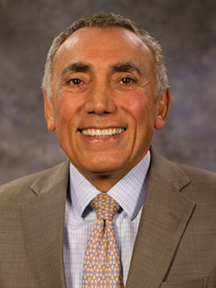Countries devastated by years of conflict, both external and internal. Cities and infrastructure in literal ruins, starvation a distinct reality with agricultural production disrupted by war, and trade all but ground to a halt. Millions of people killed or wounded, with many fleeing to seek refuge in other countries. The threat of an ideology foreign to the American public now strikes fear in the every person, and politicians rumble about "lists" of those who ascribe to this ideology. Those who call for banning groups of people should revisit the Marshall Plan.
This has been the global reality since the beginning of the Arab Spring in 2010, but eerily enough we first faced these exact same circumstances after World War II when much of Europe was in shambles.
Our response to the WW2 humanitarian crisis was the introduction of the Marshall Plan in 1947 - an entirely new direction in American foreign policy. Describing the devastation of Europe's economies and societies, Marshall pledged the United States would do "whatever it is able" to help rebuild the continent and restore its "normal economic health," without which there could be "no political stability and no assured peace" throughout the world.
Marshall's premise was straightforward: Economic crisis, he observed, produced social dissatisfaction, and social dissatisfaction generated political instability.
Around the same time on home soil, our fear of Germans and Japanese was being transferred onto the communist Soviet Union. Though the Soviets had been our ally during the war, we began to see them as a threat. The Soviets had a nuclear bomb and were aggressively expanding their influence into Europe and Africa. China was soon taken over by communists. Many left-wing organizations and minority groups (including immigrant groups) became targets of suspicion, surveillance, and discrimination. This legacy of fear started with McCarthy in 1950 but lingered long into the 1970's as evidenced by FBI surveillance of the civil rights movement and Vietnam era anti-war demonstrations.
It seems simple to say, but regional stability is not as simple as eliminating a group of radical people. We have seen how the roots of instability are deeper than one group of radical-thinking individuals, with another radical group filling the void when the other is pushed out. For the roots of instability lie in social, cultural, and economic issues. The Islamic State has taken advantage of these root issues and uses recruitment techniques that have been largely successful in recruiting young people by utilizing their anger and frustration felt by the lack of opportunity.
We can choose to look to eliminate the root causes of political instability in the region, an admittedly involved and complex process, or focus solely on the effects with sweeping slogans and sound bites. Do we retreat into fear, isolationism and discrimination of Muslims, or do as Marshall proposed, with a "remedy" to rehabilitate "the entire fabric" of their economies.
After World War II the only major power in the world that was not significantly damaged was the United States, but that is certainly not the case now. With today's global issue requiring a global solution it is high time that all major nations including those countries in the Middle East who are not taking on their fair share of the responsibility, do so.
Two very different responses to the new reality at the end of World War II -- one was the Marshall Plan and the other was McCarthyism. We have the benefit of hindsight in both of these approaches to evaluate how to best respond to the current situation happening in the Middle East, but only if we choose to learn from history.
The question for America still remains; will we lead by example in this endeavour?
**Dr. Fariborz Ghadar is founding director of The Center for Global Business Studies at Penn State's Smeal College of Business and a senior adviser at the Center for Strategic and International Studies. . He is author of the book Becoming American: Why Immigration is Good for Our Nation's Future. Follow him on Twitter @FGhadar






